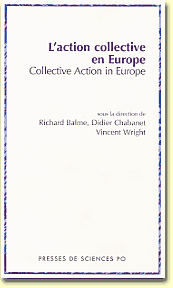
 |
À qui profite l'Europe ? Les intérêts historiquement organisés au sein des États-nations sont largement affectés par l'intégration européenne. Un répertoire d'action assez ouvert s etend aujourd'hui du lobbying bruxellois aux eurorèves. Peut-on parler pour autant d'européanisation de l'action collective ? Comment ces mobilisations affectent-elles les clivages et les relations entre les groupes d'intérêt ? Quel éclairage ces processus apportent-ils sur la constitution de l'espace public européen ? Les travaux rassemblés dans cet ouvrage analysent les aractéristiques et les transformations du système d'intérêts européen. Ils montrent que Si la conflictualité sociale prend ujourd'hui une dimension européenne, c'est moins pour contester l'intégration dans ses principes que pour lui donner un tour plus politique.
Who gets what from Europe ? Interest groups historically organised on a nation-state basis have been deeply affected by uropean integration. Today, they possess a repertoire of political action ranging from lobbying in Brussels to Europe-vide strikes. Are we witnessing, then the eropeanisation of ollective action ? How have these new forms of mobilisation affected political cleavages and relations among interest-groups ? That light do these new processes throw on the constitution of European plublic space? The contributions to this volume nalyse the principal characteristics and the current transforma-ions of the European system of interests. They demonstrate that if social conflict has taken on a European dimension, it is less to put into question integration as such than to strengthen its political aspects.
Table des matières
Introduction.
Action collective et gouvernance de l'Union
européenne, par Richard Balme (professeur de science politique,
Institut d'études politiques de Paris-CEVIPOF) et Didier
Chabanet
(docteur en science politique, Marie Curie Fellow, Centre Rohert Schuman,
Institut Universitaire Européen de Florence, Italie)
Première
partie : Cadres d'analyse
Chapitre 1. Pluralisme ouvert ou restreint? Les groupes d'intérêt dans l'Union européenne, par Sonia Mazey (Faculty Lecturer in Politics and Tutorial Fellow, Hertford College, Université d'Oxford) et Jeremy Richardson (Professor in Comparative European Govemment, Nuffield College, Université d'Oxford)
Chapitre 2. The EU as a Target of Political Mobilisation : is there a Europeanisation of Conflict?, par Dieter Rucht (Professor of Sociology, Wissenschafrszentrum Berlin für Sozialforschung)
Chapitre 3. La contestation politique dans l'Europe en formation, par Doug Imrg (Associate Professor, Department of Political Science, Universitv of Memphis) et Sidney Tarrow (Professor of Govemment and Sociology, Cornell University)
Deuxième partie : L'Europe comme arène politique
Chapitre 4. EU Interest Groups and their Members : When is Membership a "Collective Action Problem"?, par Justin Greenwood (chercheur à la Fondation nationale des sciences politiques, CERI)
Chapitre 5. Business Interests and European Integration, par David Coen (Senior Research Fellow in Economics and Regulation, London Business School, London University)
Chapitre 6. The Impact of the European Union on the Trade Union Movement, par Ann P. Branch (DPhil candidate, Nuffield College, Oxford University)
Chapitre 7. Les agriculteurs et les institutions communautaires: du corporatisme agricole au lobbyisme agro-alimentaire, par Hélène Delorme
Chapitre 8. The Mobilisation of Territorial Interests and Multilevel Governance, par Liesbet Hooghe (Associate Professor, University of North Carolina at Chapel HilI)
Troisième
partie : Nouveaux thèmes, nouvelles mobilisations
Chapitre 9. The Europeanisation of Environmentalism, par Christopher A. Rootes (Senior Lecturer in Sociology at the Universitr of Kent at Canterbury, Director of the Centre for the Study of Social and Political Movements)
Chapitre 10. L'Union européenne et les droits des femmes: de l'européanisation des agendas nationaux à la nationalisation d'un agenda européen ?, par Sonia Mazey (Faculty Lecturer in Politics and Tutorial Fellow, Hertford College, Université d'Oxford)
Chapitre 11. Le champ politique de l'immigtation en Europe : opportunités, mobilisations et héritage de l'État national, par Marco Giugni (chercheur au Département de science politique de l'Université de Genève) et Florence Passy (Maître d'enseignement et de recherche au Département de science politique de l'Université de Genève)
Chapitre 12. Les marches européennes contre le chômage, la précarité et les exclusions, par Didier Chabanet
Chapitre 13. Le moment Vilvorde : action protestataire et espace public européen, par Pierre Lefébure (doctorant, Institut d'études politiques de Paris-CEVIPOF) et Eric Lagneau (doctorant, Institut d'études politiques de Paris-CEVIPOF)